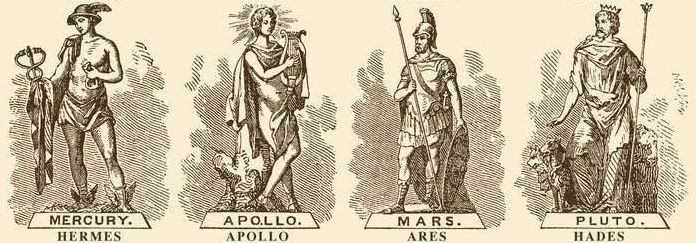
Greek mythology and astrology share a deep connection. Ancient civilizations linked gods to celestial bodies, influencing how people understood the universe. The Greeks assigned planets to their deities, believing they controlled different aspects of life. Today, these associations still shape astrology, guiding personality traits and fate. The Greek Gods are a well known pantheon of Gods. Many have planetary associations.
Greek Gods: Zeus – Jupiter: The King of the Gods
Zeus, ruler of Mount Olympus, connects with Jupiter, the largest planet. Both symbolize power, expansion, and wisdom. Jupiter represents abundance, leadership, and justice, much like Zeus, who governed the gods and upheld divine law. In astrology, Jupiter brings luck and prosperity, mirroring Zeus’s grand influence.
Greek Gods: Ares – Mars: The God of War
Ares, the fierce god of war, corresponds to Mars. This red planet stands for aggression, action, and courage. Ares embodied raw strength and conflict, just as Mars governs ambition and competition. Those under Mars’s influence often display passion, drive, and resilience, traits closely tied to Ares.
Greek Gods: Aphrodite – Venus: The Goddess of Love
Aphrodite, the goddess of beauty and love, links to Venus, the planet of romance and harmony. Both radiate charm, desire, and sensuality. Venus rules attraction, relationships, and artistic expression, much like Aphrodite’s enchanting presence among gods and mortals alike.
Greek Gods: Hermes – Mercury: The Messenger God
Hermes, swift and intelligent, connects with Mercury, the fastest planet. Both represent communication, travel, and intellect. Hermes guided souls and delivered messages, just as Mercury influences speech, thought, and adaptability. Those ruled by Mercury often display wit, curiosity, and quick thinking.
Greek Gods: Cronus – Saturn: The Titan of Time
Cronus, the father of Zeus, aligns with Saturn, the planet of discipline and karma. Known for ruling over time, Cronus reflects Saturn’s themes of responsibility, structure, and patience. Saturn’s influence often brings challenges, but it rewards perseverance, much like Cronus’s strict yet inevitable rule over destiny.
Greek Gods: Poseidon – Neptune: The God of the Sea
Poseidon, ruler of the oceans, pairs with Neptune, the mystical planet of dreams and intuition. Both govern water, emotions, and imagination. Neptune’s energy fosters creativity and spirituality, reflecting Poseidon’s unpredictable yet deeply powerful nature.
Hades – Pluto: The God of the Underworld
Hades, lord of the dead, corresponds to Pluto, the planet of transformation. Pluto governs endings, rebirth, and hidden truths, mirroring Hades’s dominion over the afterlife. This connection emphasizes deep change, power, and the unseen forces that shape existence.
Conclusion: A Celestial Reflection
Greek gods and planets share more than just names. Their energies align, influencing human life through mythology and astrology. Understanding these connections helps uncover deeper meanings behind personality traits and cosmic events. Whether seeking wisdom from Jupiter or passion from Mars, the divine and the celestial continue to guide us.

